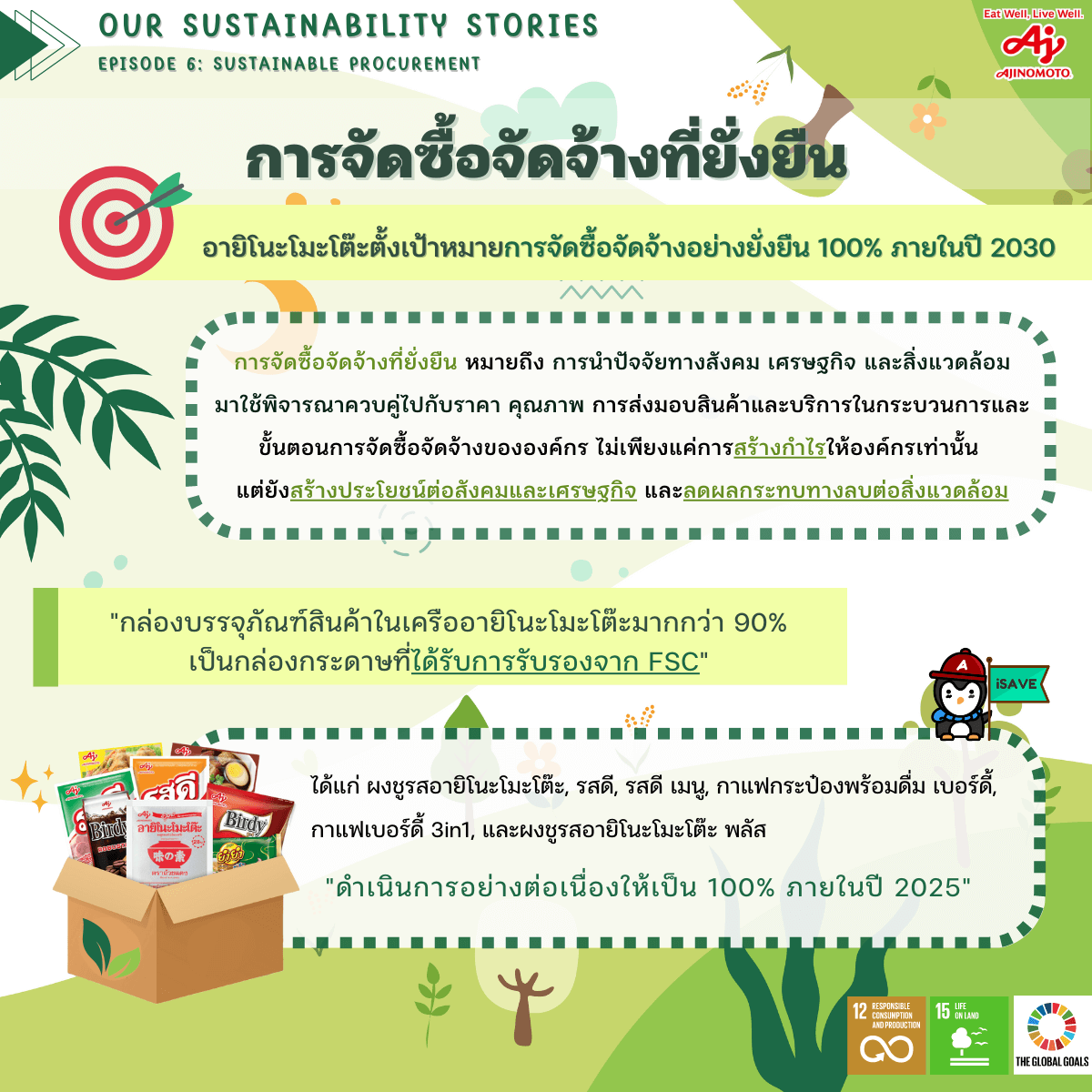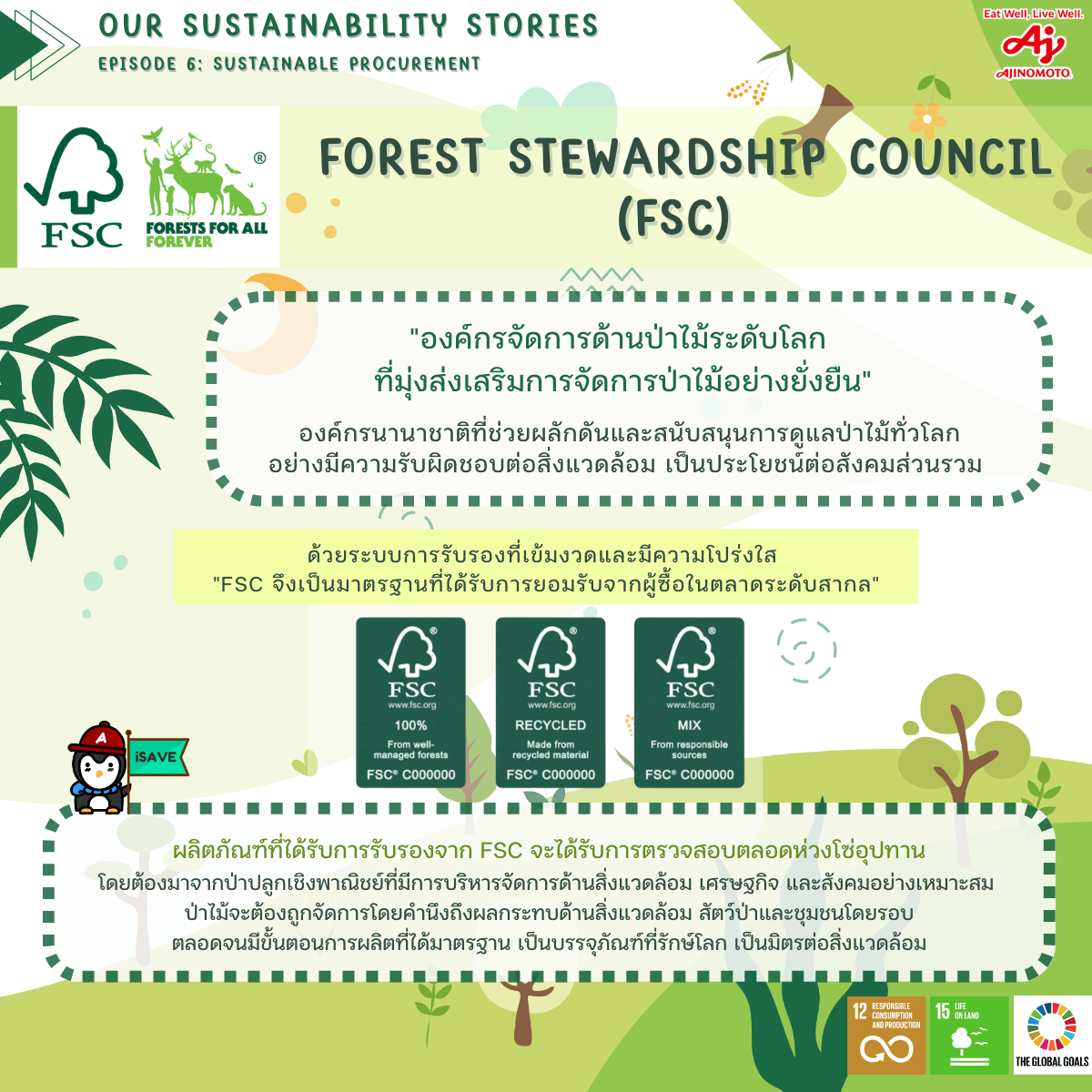การจัดซื้อจัดจ้างที่ยั่งยืนของอายิโนะโมะโต๊ะ
เป็นที่ทราบกันดีว่า ก่อนหน้านี้การให้ความสำคัญกับการจัดซื้อที่เป็นมิตรต่อสิ่งแวดล้อมนั้นมุ่งเน้นไปที่ด้านสิ่งแวดล้อมเป็นหลัก หรือที่เรียกว่า "การจัดหาสีเขียว" และการจัดซื้อที่เป็นมิตรต่อสิ่งแวดล้อม โดยมีความพยายามที่จะหาสิ่งทดแทนวัสดุหนึ่งชนิดเพื่อเป็นทางเลือกที่เป็นมิตรต่อสิ่งแวดล้อมมากกว่า แต่การจัดซื้อจัดจ้างอย่างยั่งยืนมีความหมายที่มากกว่านั้น การจัดซื้อจัดจ้างที่ยั่งยืน หมายถึง การนำปัจจัยทางสังคม เศรษฐกิจ และสิ่งแวดล้อมมาใช้พิจารณาควบคู่ไปกับราคา คุณภาพ การส่งมอบสินค้าและบริการในกระบวนการและขั้นตอนการจัดซื้อจัดจ้างขององค์กร ไม่เพียงแค่การสร้างกำไรให้องค์กรเท่านั้น แต่ยังสร้างประโยชน์ต่อสังคมและเศรษฐกิจ และช่วยลดผลกระทบทางลบต่อสิ่งแวดล้อมด้วย
บริษัท อายิโนะโมะโต๊ะ (ประเทศไทย) จำกัด ตอบสนองนโยบายของกลุ่มบริษัทอายิโนะโมะโต๊ะ มุ่งมั่นทำงานเพื่อลดผลกระทบต่อสิ่งแวดล้อม โดยยึดหลัก Green Technology for Better Earth Partner เป็นกรอบขับเคลื่อนผ่านกิจกรรมทางธุรกิจในทุกสถานประกอบการ ซึ่งมุ่งลดผลกระทบต่อสิ่งแวดล้อมและฟื้นฟูสิ่งแวดล้อมอย่างยั่งยืน ในฐานะบริษัทอาหารชั้นนำระดับโลก บริษัทได้ให้คำมั่นสัญญาเพื่อรักษาความยั่งยืนของโลกผ่านกิจกรรมที่หลากหลาย เช่น การใช้เทคโนโลยีการผลิตที่เป็นมิตรต่อสิ่งแวดล้อม การพัฒนาบรรจุภัณฑ์ที่เป็นมิตรต่อสิ่งแวดล้อม การลดใช้พลาสติก และการเปลี่ยนมาใช้พลาสติกที่รีไซเคิลได้ รวมถึงการใช้กระดาษจากป่าปลูกเพื่อลดการตัดไม้ทำลายป่า ด้วยหลักการการปล่อยมลพิษเป็นศูนย์ในการดำเนินธุรกิจ เพื่อลดผลกระทบต่อสิ่งแวดล้อมให้ได้มากที่สุด นอกจากนี้ อายิโนะโมะโต๊ะยังมุ่งมั่นที่จะใช้การจัดการการจัดซื้อจัดจ้างอย่างยั่งยืน โดยเน้นการจัดหาวัตถุดิบจากแหล่งที่ปฏิบัติตามแนวทางปฏิบัติที่เป็นมิตรต่อสิ่งแวดล้อมหรือสร้างผลกระทบต่อสิ่งแวดล้อมให้น้อยลง เช่น การเปลี่ยนมาใช้บรรจุภัณฑ์กระดาษที่ได้รับการรับรองมาตรฐาน FSC เป็นต้น
ด้วยความมุ่งมั่นของอายิโนะโมะโต๊ะในการที่จะลดผลกระทบด้านสิ่งแวดล้อม จึงตั้งเป้าหมายการจัดซื้อจัดจ้างที่ยั่งยืน 100% ภายในปี 2030 และดำเนินการเปลี่ยนกล่องบรรจุภัณฑ์สินค้าในเครืออายิโนะโมะโต๊ะ จากเดิมที่ใช้เป็นกล่องกระดาษทั่วไป มาเป็นกล่องกระดาษที่ได้รับการรับรองจาก FSC โดย FSC หรือ Forest Stewardship Council เป็นองค์กรจัดการด้านป่าไม้ระดับโลก ที่มุ่งส่งเสริมการจัดการป่าไม้อย่างยั่งยืน โดยการสนับสนุนการดูแลป่าไม้ทั่วโลกอย่างมีความรับผิดชอบต่อสิ่งแวดล้อม เป็นประโยชน์ต่อสังคมส่วนรวม และสามารถบริหารจัดการให้เกิดผลทางเศรษฐกิจได้อย่างยั่งยืน เพื่อให้การจัดการป่าไม้ของโลกเป็นไปอย่างรับผิดชอบ ด้วยระบบการรับรองที่เข้มงวดและมีความโปร่งใส FSC จึงเป็นมาตรฐานที่ได้รับการยอมรับจากผู้ซื้อในตลาดระดับสากล
ผลิตภัณฑ์ที่ได้รับการรับรองจาก FSC จะได้รับการตรวจสอบตลอดห่วงโซ่อุปทาน เพื่อให้มั่นใจได้ว่ามาจากป่าปลูกเชิงพาณิชย์ที่มีการบริหารจัดการที่ดี มีการบริหารจัดการด้านสิ่งแวดล้อม เศรษฐกิจ และสังคมอย่างเหมาะสม มีความรับผิดชอบต่อสังคมและเป็นไปอย่างโปร่งใส ป่าไม้จะต้องถูกจัดการโดยคำนึงถึงผลกระทบด้านสิ่งแวดล้อม สัตว์ป่าและชุมชนโดยรอบ ตลอดจนมีขั้นตอนการผลิตที่ได้มาตรฐาน เป็นบรรจุภัณฑ์ที่รักษ์โลก เป็นมิตรต่อสิ่งแวดล้อม
 |  |
ปัจจุบันกล่องบรรจุภัณฑ์สินค้าในเครืออายิโนะโมะโต๊ะมากกว่า 90% เปลี่ยนมาใช้กล่องกระดาษที่ได้รับการรับรองจาก FSC แล้ว ได้แก่ ผงชูรสอายิโนะโมะโต๊ะ, รสดี, รสดี เมนู, กาแฟกระป๋องพร้อมดื่ม เบอร์ดี้, กาแฟเบอร์ดี้ 3in1, และผงชูรสอายิโนะโมะโต๊ะ พลัส และกำลังดำเนินการอย่างต่อเนื่องให้เป็น 100% ภายในปี 2025 เพื่อให้บรรลุเป้าหมายที่การจัดซื้อจัดจ้างอย่างยั่งยืน 100% ภายในปี 2030
ทั้งนี้การจัดซื้อจัดจ้างที่ยั่งยืนของอายิโนะโมะโต๊ะ สอดคล้องกับเป้าหมายการพัฒนาที่ยั่งยืน (Sustainable Goals; SDGs) ข้อที่ 12 Responsible Consumption and Production การมีแบบแผนการผลิตและการบริโภคอย่างมีความรับผิดชอบ ด้วยการจัดการและการใช้ทรัพยากรธรรมธรรมชาติอย่างมีประสิทธิภาพและยั่งยืน (12.2) และ ข้อที่ 15 Life on land ปกป้อง ฟื้นฟู และสนับสนุนการใช้ระบบนิเวศบนบกอย่างยั่งยืน จัดการป่าไม้อย่างยั่งยืน ต่อสู้กับการกลายสภาพเป็นทะเลทราย หยุดการเสื่อมโทรมของที่ดินและฟิ้นสภาพกลับมาใหม่ และหยุดการสูญเสียความหลากหลายทางชีวภาพ
อายิโนะโมะโต๊ะนอกจากการส่งมอบผลิตภัณฑ์ที่มีคุณภาพให้กับผู้บริโภคแล้ว ยังมีส่วนช่วยในการร่วมอนุรักษ์สิ่งแวดล้อมพร้อมทั้งช่วยสร้างโลกสีเขียวเพื่อความยั่งยืนในอนาคตอีกด้วย
ข่าวอื่น ๆ

อายิโนะโมะโต๊ะตอกย้ำบทบาทภาคธุรกิจรับมือ Climate Change ร่วมประกาศเจตนารมณ์ขับเคลื่อน Net Zero ในงาน TBCSD Sustainable Business Forum 2025

อายิโนะโมะโต๊ะ x TerraCycle จัด Green Classroom Day ส่งเสริมการเรียนรู้ด้านสิ่งแวดล้อม พร้อมมอบชุดโต๊ะนักเรียนอัพไซเคิลให้โรงเรียน ขับเคลื่อนเศรษฐกิจหมุนเวียนอย่างยั่งยืน

จากซองหนึ่งใบสู่การเปลี่ยนแปลงที่ยิ่งใหญ่! อายิโนะโมะโต๊ะชวนคนไทยเก็บกลับบรรจุภัณฑ์ ผ่านแคมเปญ“เก็บดีมีสุข” ในงาน Green Hug